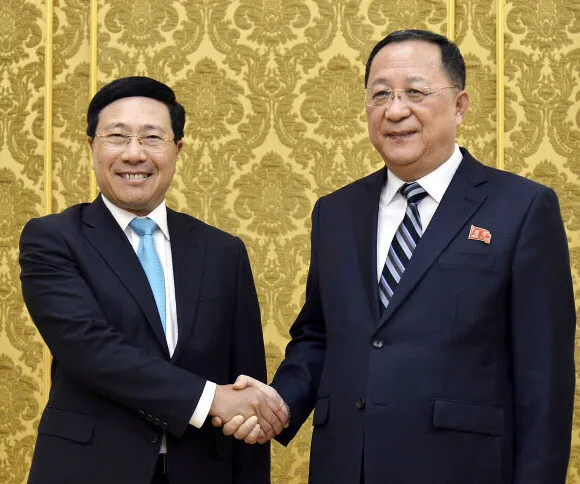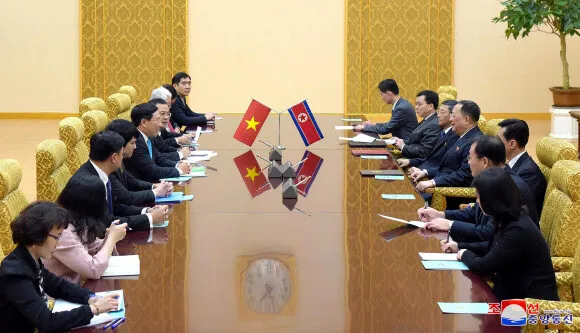hankyoreh
Links to other country sites 다른 나라 사이트 링크
[News analysis] N. Korea demands partial relaxation of sanctions in exchange for Yongbyon inspections

During the first working-level talks in Pyongyang last week for the upcoming second North Korea-US summit, the North Korean side demanded the partial loosening of sanctions in exchange for allowing inspections of its Yongbyon nuclear facilities, while the US proposed a declaration ending the Korean War as a corresponding measure. The next question is whether the two sides can find common ground going ahead – at a second set of talks scheduled for next week between US State Department Special Representative for North Korea Stephen Biegun and North Korean State Affairs Commission Special Representative for US Affairs Kim Hyok-chol, and at the summit in Hanoi at the end of the month.
According to a South Korean government source closely acquainted with the North Korea-US talks, Kim reaffirmed the North’s willingness to dismantle its Yongbyon nuclear facilities during the first round of working-level talks in Pyongyang on Feb. 6–8, while demanding the partial loosening of sanctions as a corresponding measure for allowing inspections of the facilities. The North Korean side said it “could offer more generous steps” if the US were to even partially loosen sanctions as a corresponding measure, the source reported.
Biegun’s negotiating card reportedly concerned an end-of-war declaration, which the US would offer in exchange once inspections of the Yongbyon nuclear facilities are complete. As in his public statements on the matter, Biegun stated in no uncertain terms that the US would not be able to loosen or lift sanctions. At the same time, he reportedly suggested it may consider loosening sanctions if North Korea were to offer the Yongbyon dismantlement “plus something extra.” The second North Korea-US summit now appears poised to hinge on how much progress the two sides can make in bridging their differences on the US’ “corresponding measures.”
It was not confirmed what specific areas the North Korean side mentioned in suggesting the partial loosening of sanctions as a corresponding measure for the Yongbyon inspections. One possibility mentioned among foreign affairs analysts is that it was considering a partial loosening or waiving of sanctions to allow resumption of operations at the Kaesong Industrial Complex and tourism at Mt. Kumgang, or lowering of the ceiling on crude oil supplies according to UN Security Council Resolution 2397.
An end-of-war declaration remains a decent offer for the North Korean side, but sources reported that it did not respond readily due to concerns that the US could regard it as a substitute for loosening sanctions. The Donald Trump administration appears to have suggested the end-of-war declaration based on both the strong belief that sanctions represent the only way of pressuring the North now that the military option is off the table. Trump has also indicated an unwillingness to tinker with sanctions amid criticisms in the US that the Trump administration has been “repeatedly taken in” by Pyongyang.

US likely to grant priority to inter-Korean cooperation projects
Multiple high-ranking government sources told the Hankyoreh that Washington was standing firm in its insistence that sanctions could not be loosened, but predicted that Pyongyang was unlikely to proceed with dismantlement of the Yongbyon nuclear facilities in return for an end-of-war declaration alone. Accordingly, they suggested that if North Korea adopts a more forward-thinking approach on the Yongbyon dismantlement issue during negotiations, the US may grant priority consideration to projects involving inter-Korean cooperation, including partial resumption of the Kaesong Complex and Mt. Kumgang tourism. This prediction was based on the limited range of measures available to the US without touching the current sanctions framework. Indeed, many Korean Peninsula experts have noted that the Mt. Kumgang tourism venture individually would not be in violation of UNSC resolutions and suggested that it should be quickly resumed.
Also expected to be a factor is the importance of verifiable inspections of the Yongbyon nuclear facilities. While some observers have downplayed the value of a Yongbyon dismantlement, neither South Korean nor US authorities are shrugging off the significance of dismantling a complex known to account for around 70% of the North’s nuclear facilities. A sampling of plutonium and highly enriched uranium from Yongbyon and inspections of the nuclear test site at Punggye Village would allow for some provisional analysis of North Korea’s nuclear program beyond Yongbyon, sources suggested.
During a Feb. 11 meeting with National Assembly Speaker Moon Hee-sang in Washington, DC, Biegun was quoted as saying that the “bridging of differences [with North Korea] will begin with the next meeting.”
“With just two weeks left until the summit, we can’t solve every issue, but there is the possibility if we can reach an agreement in certain respects,” he reportedly said. North Korea and US have now begun the real contest over the scope of reporting, inspections, verification, and dismantlement for the Yongbyon nuclear facilities and corresponding measures from the US side.
By Kim Ji-eun, staff reporter
Please direct comments or questions to [english@hani.co.kr]

Editorial・opinion
![[Editorial] Inquiry must clarify if gov’t pressure led to unfair Westinghouse settlement [Editorial] Inquiry must clarify if gov’t pressure led to unfair Westinghouse settlement](https://flexible.img.hani.co.kr/flexible/normal/500/300/imgdb/original/2025/0820/5317556787190915.jpg) [Editorial] Inquiry must clarify if gov’t pressure led to unfair Westinghouse settlement
[Editorial] Inquiry must clarify if gov’t pressure led to unfair Westinghouse settlement![[Column] Does ‘KPop Demon Hunters’ count as Korean? Does it matter? [Column] Does ‘KPop Demon Hunters’ count as Korean? Does it matter?](https://flexible.img.hani.co.kr/flexible/normal/500/300/imgdb/original/2025/0820/2117556793887318.jpg) [Column] Does ‘KPop Demon Hunters’ count as Korean? Does it matter?
[Column] Does ‘KPop Demon Hunters’ count as Korean? Does it matter?- [Editorial] Trump and Putin’s Ukraine deal is a warning to countries like Korea
- [Editorial] ‘Two-track’ approach with Japan does not mean disregarding past
- [Editorial] Lee’s gestures toward North Korea, Japan are a welcome step
- [Editorial] Korea-Japan summit must acknowledge past while looking to future
- [Column] Abandon all hope, you who enter radical politics
- [Column] Can Korea say ‘no’ to the US?
- [Column] Why Yoon is cosplaying as a prisoner of conscience
- [Editorial] Cho Kuk’s pardon must serve as impetus for prosecution reform
Most viewed articles
- 1Presidential office orders probe into KHNP’s 50-year ‘slave contract’ with Westinghouse
- 2[Column] Does ‘KPop Demon Hunters’ count as Korean? Does it matter?
- 3Korea mulls how to respond if US demands ‘strategic flexibility’ of USFK at summit
- 4Now in their 90s, unconverted long-term prisoners ask to be sent to North Korea
- 5Ex-interior minister charged with ordering blackout on media outlets during martial law
- 6Former bodyguard’s dark tale of marriage to Samsung royalty
- 7[Editorial] Inquiry must clarify if gov’t pressure led to unfair Westinghouse settlement
- 8USFK sprayed defoliant from 1955 to 1995, new testimony suggests
- 9[Column] Abandon all hope, you who enter radical politics
- 10[Editorial] Trump and Putin’s Ukraine deal is a warning to countries like Korea